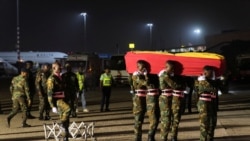Tributes and remembrances are being given in honor of Ghanaian footballer Christian Atsu, found dead in earthquake rubble.
Atsu, 31, had not been seen since the Feb. 6 disaster which caused his apartment in Antakya, a city in the southern province of Hatay to collapse.
During the period, Ghanaians took to traditional media platforms - calling into radio stations with prayers and hopes for a miracle - that he's found alive. Others resorted to social media spaces expressing hope for his return. But that hope was dashed when Atsu's agent confirmed that his body was discovered under the rubble on Saturday, sending a nation into mourning and disillusionment.
An emotional Juliet Bawuah, an Accra-based sports broadcaster told VOA that Atsu was a man of the people, hence the overflow of love to him and his grieving family.
“The outpouring of love means only one thing - a nation that is united in grief over one of their own,” she said.
“(Christian Atsu was) a man after the hearts of many - young, old, widows, orphans, prisoners, the destitute, and the marginalized. He did good everywhere he went (and impacted) the lives of so many people through charitable works, some of which, many are now getting to know.”
She said what was peculiar about the late 31-year-old footballer was that his charitable works were held in-camera unlike the pomp and pageantry that followed those of other celebrities in the West African nation.
“To many of his beneficiaries, Atsu was a gift that kept giving,” Bawuah said adding that “a lot of the good he (Atsu) did came with little to no publicity. That's how he always goes about doing his stuff. This is a big loss,” she added.
A Nigerian comedian and skit maker, Emmanuel Iwueke, popularly known as Craze Clown tweeted Saturday that the former Chelsea, Newcastle and Porto winger supported his education at some point in his life.
“When I lost my dad, he (Atsu) reached out and offered to pay my fees till I graduated and he did,” the comedian told his more than 210,000 followers.
Gary Al-Smith, a sports journalist with Accra-based Multimedia Group told VOA that Atsu's public figure status and influence helped draw attention to his plight in the aftermath of the earthquake that has so far killed more than 40,000 people according to Turkish disaster authorities.
“I've come to the conclusion that (the support showed by Ghanaians to Atsu) were simply because of his humanitarian work in addition to the fact that he was a Ghanaian and so he's one of our own,” he said.
“Also, he was a public figure - a Ghana national team player - a Black star player. But most importantly, I think that the goodwill stem from the fact that he (Atsu) used his influence and his wealth to help his fellow man.”
Al-Smith said Atsu played for a lower division side called Cheetah FC before heading to Portugal in 2010. But he said the Black star players' performances for the national team, for whom he played eight years, since 2012 provided an inspiration for young people.
“He (Atsu) played more than 60 times for the Ghana national team across four Africa Cup of Nations tournaments and one FIFA World Cup. He particularly inspired people when he played the 2015 African Cup of Nations tournament where he was declared the player of the tournament, because of his sterling performance,” Al-Smith said.
“People will remember him for that.”
On Saturday, Atsu's agent Nana Sechere declined an interview with VOA requesting “privacy for his family during this very difficult time.”
He's survived by a partner and three children.








